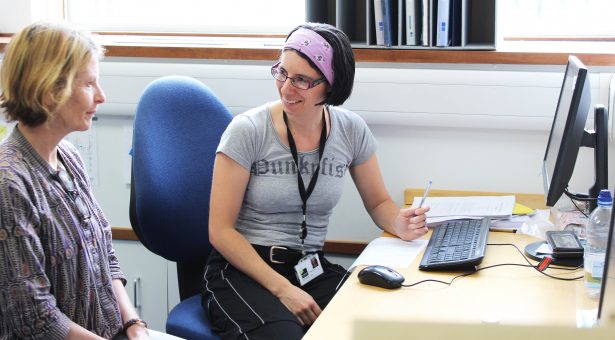A day in the life of our computing team

Behind every scientist, is a team of people working behind the scenes to help enable the research to continue.
In the latest of our ‘Introducing’ series, we sit down with Becky Owen from our computing team, to ask if turning it off and on again really does work?
“Yes, turning it off and on still works and it fixes some real oddities. In fact, it is still often the first question I ask.
That said, I love the fact that my job is different every day. We get a few recurring issues of course, but many of those are automated, so we can focus on the less routine stuff.
I love being able to solve problems, when someone comes to you with a problem and I help them resolve it, so they can get back to work, it is really satisfying. My role means I can often get out to visit people and equipment in their offices and labs and it’s fascinating when people talk about what they’re doing.
The Computing team works across the collection of Norwich Bioscience Institutes located here on the Norwich Research Park, so I help cover the John Innes Centre, Earlham Institute, Quadram Biosciences and Sainsbury Laboratory.
We work on the hardware and software of the computing network; essentially, we get it all to work, maintain it and then fix it when something goes wrong, from making the initial diagnosis, to implementing the fix.
As with lots of scientific support services, we are here to allow the scientists and their research to shine.
The nature of scientific research and scientific equipment makes our roles uniquely challenging because, scientific equipment generates data and some instruments generate huge volumes of it, but if the computer holding the data doesn’t have antivirus protection it isn’t allowed to use the network here. Scientists still need to access that data and so it’s our job to implement solutions that both keep everything secure and allow people to do their work.
Because we work across a variety of plant and microbial scientific institutes, who are all doing cutting-edge research, security has to be paramount and I’d like to think we are one of the most secure group of institutes.
Last year I was really proud to be able to play a part in the installation of our new Cryo-TEM.
The arrival of any new piece of scientific research equipment is exciting and to be able to help get this up and running was really enjoyable. Logistically installing it was a huge operation, requiring the removal of doors and walls, but also a lot of electro-magnetic work to ensure it didn’t interfere with other pieces of equipment, or even the nearby lift.
I got to work on the computer that the Cryo-TEM talks to, which was super cool. It was a real challenge, because you’re working within a lot of constraints, for example the software might not want anti-virus software (mentioned above) added to it, or be set-up to handle automatic updates, so you’re constantly working to resolve those little unforeseeable issues to get it talking to our network in a safe way and outputting data in a way that works for the technician working on the machine.
I have been here in the Norwich Bioscience Institutes Partnership Computing team for 18 months now. Before I came here, I was working in a learning support role at a local Sixth Form College, so moving here has been a complete career change.
I’ve always been interested in technology and even at the college I would often be working with students to solve bugs or overcoming ways to help them access technology and technological resources, so it wasn’t as big a shift as it sounds.
One of the things I have really carried from there is an interest in learning difficulties and technological solutions. I’d perhaps like to see more of that for staff here, for example, people who suffer from visual strain and would benefit from coloured paper or with dyslexia and may need dictation software or appropriate support. I especially enjoy jobs where I help people to find a way to meet a need like that, and though they don’t come along that often, I’m able to assist with these types of issues. It’s all about accessibility and making things easier where possible for people.
I have always harboured a secret desire to be a scientist, so to have the chance to come here and help facilitate world-leading biological science, is just incredible.”
